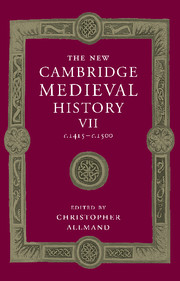Book contents
- Frontmatter
- PART I GOVERNMENT
- PART II ECONOMIC AND SOCIAL DEVELOPMENTS
- PART III SPIRITUAL, CULTURAL AND ARTISTIC LIFE
- PART IV THE DEVELOPMENT OF EUROPEAN STATES
- 17 Germany and the Empire
- 18 Hus, the Hussites and Bohemia
- 19 France
- 20 Burgundy
- 21 England
- 22 The Celtic world
- (a) Ireland
- (b) Scotland: 1406–1513
- (c) Wales
- 23 Italy
- 24 The Iberian peninsula
- 25 The Swiss Confederation
- 26 The States of Scandinavia, c. 1390– c. 1536
- 27 Hungary: Crown and Estates
- 28 The Kingdom of Poland and the Grand Duchy of Lithuania, 1370–1506
- 29 Russia
- 30 Byzantium: The Roman Orthodox World, 1393–1492
- 31 The Latin East
- 32 The Ottoman World
- 33 Conclusion
- Appendix Genealogical Tables
- Primary Sources and Secondary Works Arranged by Chapter
- Index
- Frontispiece
- Plate section
- Map 1 European towns in the late Middle Ages
- Map 2 European commerce and trade
- Map 4 Winds and currents facilitating the discoveries
- Map 5 The universities o f Europe in 1400 and 1500
- Map 6 Germany and the Empire
- Map 20 The Roman Orthodox and Ottoman worlds in the fifteenth century
- References
(b) - Scotland: 1406–1513
from 22 - The Celtic world
Published online by Cambridge University Press: 28 March 2008
- Frontmatter
- PART I GOVERNMENT
- PART II ECONOMIC AND SOCIAL DEVELOPMENTS
- PART III SPIRITUAL, CULTURAL AND ARTISTIC LIFE
- PART IV THE DEVELOPMENT OF EUROPEAN STATES
- 17 Germany and the Empire
- 18 Hus, the Hussites and Bohemia
- 19 France
- 20 Burgundy
- 21 England
- 22 The Celtic world
- (a) Ireland
- (b) Scotland: 1406–1513
- (c) Wales
- 23 Italy
- 24 The Iberian peninsula
- 25 The Swiss Confederation
- 26 The States of Scandinavia, c. 1390– c. 1536
- 27 Hungary: Crown and Estates
- 28 The Kingdom of Poland and the Grand Duchy of Lithuania, 1370–1506
- 29 Russia
- 30 Byzantium: The Roman Orthodox World, 1393–1492
- 31 The Latin East
- 32 The Ottoman World
- 33 Conclusion
- Appendix Genealogical Tables
- Primary Sources and Secondary Works Arranged by Chapter
- Index
- Frontispiece
- Plate section
- Map 1 European towns in the late Middle Ages
- Map 2 European commerce and trade
- Map 4 Winds and currents facilitating the discoveries
- Map 5 The universities o f Europe in 1400 and 1500
- Map 6 Germany and the Empire
- Map 20 The Roman Orthodox and Ottoman worlds in the fifteenth century
- References
Summary
fifteenth-century Scotland was a very violent society It was also a very fragmented one. Neither of these things make it particularly unusual. External threats and internal rivalries bedevilled fifteenth-century European monarchs, papal and secular; and the Scottish Highland–Lowland divide, much exaggerated in any case by the rival schools of tartan romanticists and searchers for excessive disorder, did not notably differentiate Scotland from the France of the independent lordships and great appanages or the Empire of multifarious German principalities. Nevertheless, a period which begins in 1406 with the death of a lamentable king, Robert III, and ends in 1513 with the death of one of the most outstandingly successful ones, the ‘glore of princelie governyng’, James IV, does mark Scotland out. For the end of every reign, whether it had been a failure or a success, produced the same outcome: another collapse of royal authority, another dismal decline into faction-ridden minority. Whether at the hands of their subjects, a faulty cannon or the English, the early deaths of the Stewart kings, their consistent inability to survive to see their sons grow up, created a problem which could not be put down to the instability caused by competing claimants – from rival popes to rival kings for the thrones of France, England or Castile – or by power-hungry princes and magnates. It marked a visible and enduring flaw in the senior line of the royal house of Stewart itself.
Keywords
- Type
- Chapter
- Information
- The New Cambridge Medieval History , pp. 514 - 531Publisher: Cambridge University PressPrint publication year: 1998
References
- 1
- Cited by



